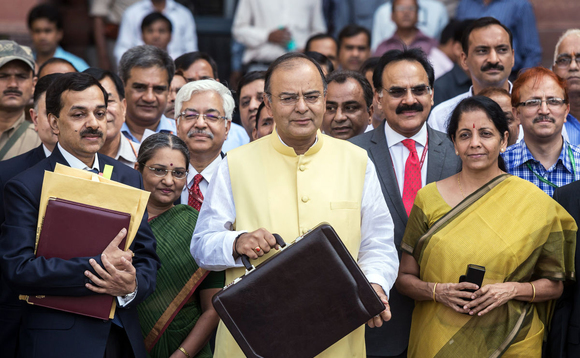
Clarity calls: The PE take on India's budget

The first full budget by Prime Minister Narendra Modi’s government was one of the most eagerly anticipated events for Indian private equity since last year’s election. Did it live up to the hype?
When Indian Finance Minister Arun Jaitley arrived the parliament building to present the union budget in July of last year nobody thought that the small brown case he was carrying would contain much.
Delayed by an election, the budget was being submitted by a government that been in power for just two months. True to expectations, while offering some reassurances that Narendra Modhi, the new prime minister, was more business friendly than his predecessor, it gave little in the way of concrete answers.
The document included several broad macroeconomic targets such as tackling the deficit by reducing subsidies and encouraging growth through infrastructure investment. For private equity, perhaps the most positive development was liberalization of foreign direct investment (FDI) in certain sectors and promises of greater clarity on tax policies.
However, the consensus then was that it was still too early to make a call on whether the government would live up its promise.
This budget is different. Modi has been in power for 10 months and the industry wants to see firmer proposals. Until now the government seems to have hit a lot of positive notes with private equity and the business community as a whole; but last week's budget is arguably the best indicator so far as to whether Modi can match rhetoric with action.
"I think overall the government seems to have addressed some of the taxation and fundraising issues facing the private equity industry in India," says Reshmi Khurana, managing director with Kroll. "Especially those who are aware that the lack of clarity has been an impediment to investing in India."
Passing through
One of the headline proposals made by Jaitely during his 90-minutes speech concerned tax pass-through status for Category I and II alternative investment funds (AIF).
At present, pass-through status is only granted to a sub-category of venture capital funds (VCFs) within Category I funds. This generally includes any vehicle deemed to have a positive spillover effect on the wider economy, such as an infrastructure funds, social impact funds, or funds targeting small- to medium-sized enterprises (SMEs). By including the rest of Category I and all of Category II, the government is bringing into the fold sector-specific and sector-agnostic funds that might be entirely commercially-oriented.
Pass-through status means that dividends will not be taxed at the fund level; the tax liability flows through to the LPs as if they had made a direct investment in the portfolio company that is generating the income. The only exception to this rule is that any income categorized as business or professional income, such as fees. These will continue to be taxed at the fund level.
Meanwhile, Category III AIFs are not included in the tax exemption. These are vehicles that generally use large amounts of leverage to generate short-term returns, i.e. hedge funds.
"I think government's ambition has been to give the alternate assets investment space as whole the leg up it needs," says Sanjeev Krishan, private equity leader with PwC. "Domestic venture funds always had pass-through status but Category II funds were left out, so this latest change has brought some relief."
Encouragingly, the finance minister has also proposed to allow other categories of foreign investors to commit to AIFs whereas currently this privilege was restricted to non-resident Indians. This could make it significantly easier for domestic fund managers to raise capital.
Another source of comfort for the private equity industry is the decision to defer the implementation of the general anti-avoidance rules (GAAR) for two years. The anti-tax avoidance regulation - which was introduced by Jaitley's predecessor Pranab Mukherjee in 2012 and was due to kick in next month - has been especially controversial because it contains provisions allowing revenue agencies to seek taxes from past overseas deals involving local assets retroactively. It is blamed for making financial and strategic investors wary of participating in India.
However, not only has GAAR been deferred, but has been proposed that all investments made up until March 31, 2017 - when GAAR finally comes into effect - should be made exempt from the regulation.
"This has been a big concern for the industry and I think the finance minister pushing GAAR back gives a lot of hope that the government doesn't intend to use any heavy-handed tactics to generate income," says Dhanpal Jhaveri, managing partner at Everstone Capital. "The government wants to give comfort to global investors that there won't be a witch hunt, and the deferment of GAAR gives us more breathing space to invest capital without worrying about implications further down the line."
Shades of gray
The flipside to this is that - while the government has provided some important answers - there are still significant gray areas unsettling investors. For example, with regards to AIF tax pass-through, the budget did not clarify the distinction between a fund's investment income and its business income. "I think while the intent is brilliant, the fine print could leave a bit of a sour taste," says PwC's Krishan.
A number of industry participants are also concerned that the government has not followed up its promise not to enforce retrospective tax with a commitment to remove this provision from GAAR completely.
Nevertheless, the general feeling is that the budget marks some significant wins for the industry because it takes steps to reassure investors. "This is a fairly positive budget because it tries to allay some of the concerns around the tax issue we have been battling in the past," says Everstone's Jhaveri. "There are still some gray areas in the finance bill which need to be addressed but overall we like it because the budget is moving away from being event-driven to becoming more focused on policy."
Even with all these policy initiatives, many market watchers stress the significance of the government's broader macroeconomic plans. The bottom line for many investors is that for the private equity industry to recover, so must the economy. Perhaps the more important question is whether the budget contains the necessary measures to drive growth.
"Overall, I don't think there are any significant big bang announcements, but I think there is enough in it to excite local production and revive the investment cycle," says PwC's Krishan.
A similar view is reflected by Kroll's Khurana who observes that the major headaches among the more established GPs in India - some of which are facing issues with fundraising - is the challenge of finding good investment opportunities. As such, they are more concerned with how the impact of the budget outside of PE.
"What many PE investors are hoping is that all the steps the government is taking - not just on the taxation issue - will help kick-start the economy and get it from 5.5% growth to close to 8%," says Khurana. "Only when the consumption cycle kicks in again will Indian entrepreneurs look to expand their businesses, and that is when they look for private equity money."
To this end, the budget has taken care to articulate a long-term vision for the country. This includes utilizing savings made on the back of cheaper oil imports to channel more capital into road and rail infrastructure; slashing spending on controversial subsidies and welfare schemes; an overhaul of the country's monetary policy; and the creation of public debt management agency.
While the budget has left the industry with lingering question marks, the sentiment remains optimistic - provided, of course, that the government maintain momentum in its reforms.
"The fact that the government is setting a longer term roadmap that will hopefully improve overall economic activity in the country is good for PE" reflects Everstone's Jhaveri. "Our business is about long-term capital investment and so we need more stability both from a political and an economic perspective."
Latest News
Asian GPs slow implementation of ESG policies - survey
Asia-based private equity firms are assigning more dedicated resources to environment, social, and governance (ESG) programmes, but policy changes have slowed in the past 12 months, in part due to concerns raised internally and by LPs, according to a...
Singapore fintech start-up LXA gets $10m seed round
New Enterprise Associates (NEA) has led a USD 10m seed round for Singapore’s LXA, a financial technology start-up launched by a former Asia senior executive at The Blackstone Group.
India's InCred announces $60m round, claims unicorn status
Indian non-bank lender InCred Financial Services said it has received INR 5bn (USD 60m) at a valuation of at least USD 1bn from unnamed investors including “a global private equity fund.”
Insight leads $50m round for Australia's Roller
Insight Partners has led a USD 50m round for Australia’s Roller, a venue management software provider specializing in family fun parks.







